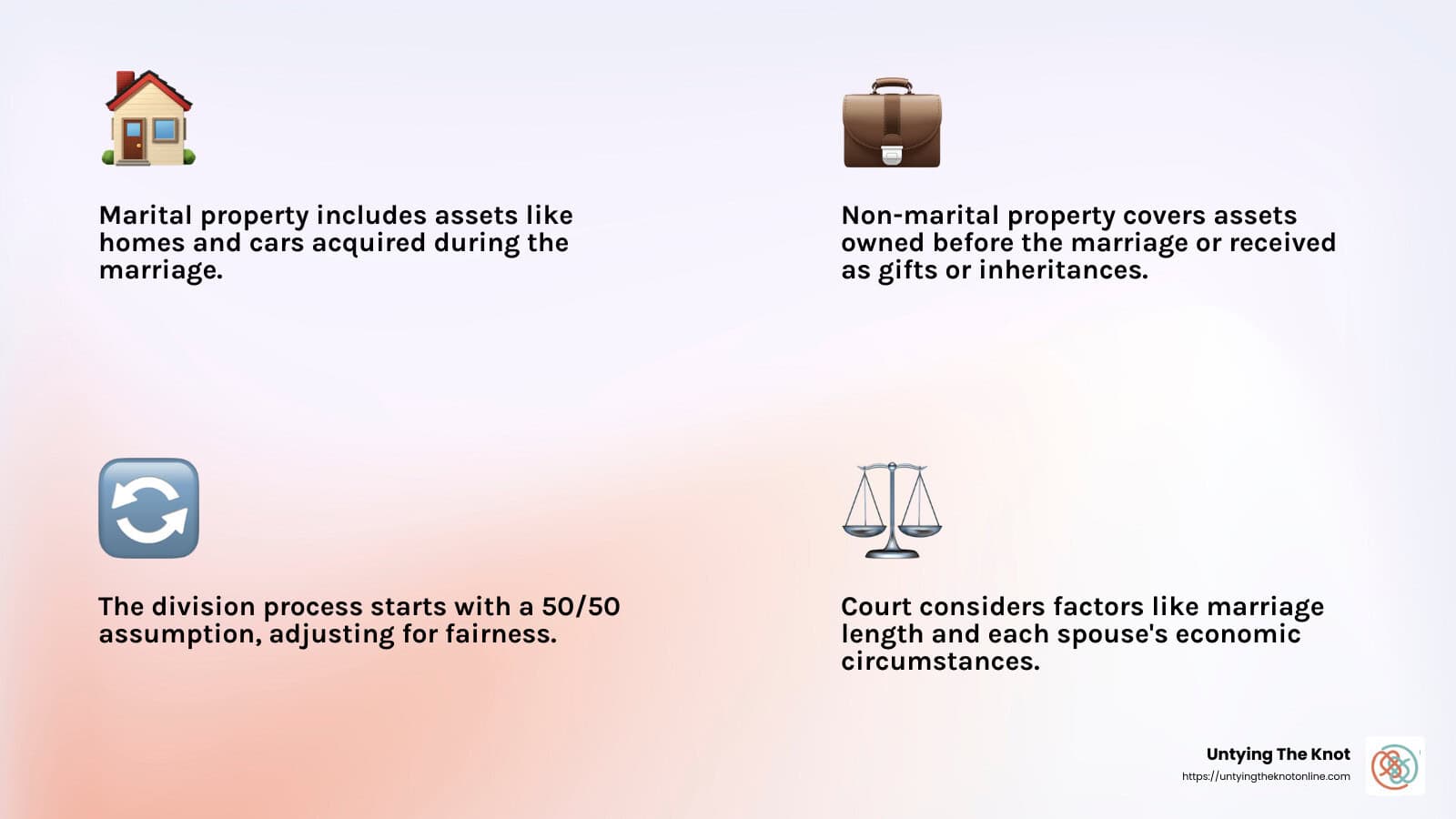- About Us
- Services▼
- Knowledge Library▼
- Stand-Alone Services▼
- Attorney Preparation of a Parenting Plan
- Attorney Preparation of Child Support Guidelines Worksheet
- Marital Settlement Agreement Preparation Services
- Attorney Review and Explanation of Your Marital Settlement Agreement, Parenting Plan And/or Final Judgment
- Attend Mediation With You as Legal Counsel
- 30 Minute Attorney Appointment
- Prep Financial Affidavit and Assist in Mandatory Financial Disclosure
- Divorce Mediation by the Hour
- Prepare All Initial Paperwork to File Your Divorce
- Served? Respond to a Divorce With Professional Guidance
- Blog
- Testimonials
- For Attorneys
- Contact Us
Splitting Assets in Florida: Understanding Equitable Distribution in Divorce

What You Need to Know About Equitable Distribution

Florida’s divorce law for equitable distribution is a key topic for anyone going through a divorce in the Sunshine State. Here’s what you need to know in a nutshell:
- Equitable Distribution: Florida follows this principle, meaning marital assets are divided fairly, though not necessarily equally.
- Marital Assets: Includes anything acquired during the marriage, except specific exclusions.
- Non-Marital Assets: Typically exclude assets acquired before marriage or gifts and inheritances.
Navigating a divorce can be daunting, especially when it involves dividing assets. In Florida, the concept of equitable distribution governs this process. Simply put, this doesn’t mean an automatic 50/50 split but rather a fair division of marital assets based on various factors.
The laws aim to ensure both parties leave the marriage on equitable grounds, taking into account each spouse’s contributions, both economic and non-economic. From handling finances to managing home life, everything each partner brings to the marriage matters in deciding how assets are divided.
Here’s a quick guide to the basics of equitable distribution in Florida:
- Identify Marital Property: Determine which assets were acquired during the marriage.
- Distinguish Non-Marital Assets: Exclude assets owned before marriage or received as personal gifts or inheritances.
- Begin with a Presumption of Equal Division: Start from a 50/50 split, adjusting for fairness.
Understanding the nuances of Florida’s divorce laws can be complicated, but knowing the fundamentals of equitable distribution and marital assets can make the journey a bit smoother. Stay informed to protect your rights and interests during this challenging time.

What is Equitable Distribution?
Equitable distribution is a legal theory used in Florida’s divorce law that guides how marital property is divided between spouses. Unlike the straightforward 50/50 split seen in community property states, equitable distribution aims for a fair division based on various factors. This approach recognizes that fairness doesn’t always mean equal.
Legal Theory
In Florida, equitable distribution is the guiding principle for dividing marital assets during a divorce. It focuses on fairness rather than equality. The court considers each spouse’s contributions, both financial and non-financial, to determine what is fair. Contributions can include income, home management, and even career sacrifices made for the family’s benefit.
Marital Property
Marital property includes all assets and debts acquired during the marriage. This could be anything from the family home to credit card debts. For example, if you bought a car during your marriage, it’s considered marital property, even if it’s in one spouse’s name.

Non-marital property, on the other hand, consists of assets owned before the marriage or received as gifts or inheritances during the marriage. These are generally not subject to division.
Fair Division
The process starts with the assumption of a 50/50 split. But the court may adjust this based on various factors to ensure fairness. These factors include:
- Length of the marriage
- Each spouse’s economic circumstances
- Contributions to the marriage, such as homemaking or supporting the other spouse’s career
A classic case illustrating this is Brown v. Brown, where the court recognized the wife’s contributions as a homemaker, despite not having a direct financial role. This case highlighted how equitable distribution can adjust for non-financial contributions to ensure a fair outcome.

Understanding Florida’s approach to equitable distribution can help you steer the complexities of divorce. By focusing on fairness, the law aims to ensure both parties leave the marriage with an equitable share of the marital property.
Florida’s Divorce Law For Equitable Distribution
In Florida, divorce law uses the principle of equitable distribution to divide assets and debts between spouses. The goal is to achieve a fair division, not necessarily an equal one. This process starts with a 50/50 starting point, but adjustments can be made based on specific statutory criteria.
Marital vs. Non-Marital Assets
Understanding the difference between marital and non-marital assets is crucial. Marital assets include anything acquired during the marriage, like the family home or shared bank accounts. Non-marital assets, however, are those owned before the marriage or received as gifts or inheritances during the marriage. These are typically not divided in a divorce.
For example, if one spouse received an inheritance during the marriage and kept it separate from joint finances, it would likely remain their own. However, if that inheritance was used to pay off a joint mortgage, it might become a marital asset.
Statutory Criteria for Asset Division
The court considers several statutory criteria to decide if the 50/50 starting point should change. These include:
- Contribution to the marriage: This could be financial, like income, or non-financial, such as homemaking or child-rearing.
- Economic circumstances of each spouse: The court looks at each spouse’s financial situation to ensure fairness.
- Duration of the marriage: Longer marriages might see a more balanced split compared to shorter ones.
- Interruption of personal careers: If one spouse gave up career opportunities to support the family, this might be considered.
A notable case, Rogers v. Rogers, demonstrated how student loan debt incurred during the marriage was divided equally, despite only one spouse accruing it. This shows how equitable distribution can apply even when financial contributions appear unequal.
Understanding these aspects of Florida’s divorce law equitable distribution can help you prepare for the division of assets and debts during a divorce. It’s a complex process, but knowing the rules can make it easier to steer.
Factors Influencing Asset Division
When it comes to splitting assets in a Florida divorce, several factors play a crucial role in determining who gets what. These factors help ensure that the division is fair or equitable, even if it’s not exactly equal.
Contribution to the Marriage
Both financial and non-financial contributions matter. Whether it’s bringing in income or taking care of the home and children, each spouse’s efforts are considered. For instance, if one spouse worked while the other managed the household, both contributions are valued.
Economic Circumstances
The financial situation of each spouse is examined. This includes looking at income, expenses, and future earning potential. The goal is to ensure that neither spouse is left financially disadvantaged after the divorce.
Duration of the Marriage
The length of the marriage can impact the division. Generally, longer marriages may result in a more balanced split of assets. In contrast, shorter marriages might not see such a division, especially if the contributions of each spouse were significantly different.
Interruption of Careers
If one spouse put their career on hold to support the family, this is taken into account. For example, if a spouse left a job to care for children, the court might adjust asset division to compensate for this career interruption.
Retention of Assets
Keeping certain assets intact is sometimes desirable, especially when it involves a business or professional practice. The court tries to minimize disruption to ongoing operations. For example, if one spouse is more involved in a business, they might retain ownership, while the other receives assets of equal value.
These factors, as outlined in Florida’s divorce law, guide the equitable distribution process. Understanding them can help you anticipate how assets might be divided in your divorce.
Calculating Equitable Distribution in Florida
Understanding how assets are divided in a Florida divorce involves a few key concepts: valuation date, cut-off date, and asset classification. These elements help ensure a fair division of property, as outlined by Florida’s divorce law on equitable distribution.
Valuation Date
The valuation date is crucial in determining the worth of marital assets. It refers to the specific date when the value of an asset is assessed. In Florida, the court has flexibility in choosing this date. It could be the date of filing for divorce, the date of trial, or another date deemed appropriate by the judge.
For example, if you own a business, its value might fluctuate over time. The court may decide to use the date of filing as the valuation date to capture the asset’s worth at that moment. This ensures an accurate and fair assessment of what each spouse is entitled to.
Cut-off Date
The cut-off date marks the end of the marital period for asset accumulation. This is typically the date when one spouse files for divorce. Any assets or debts acquired after this date are generally considered non-marital and belong to the individual who acquired them.
Imagine you file for divorce on June 1st. If you purchase a car on June 15th, that car is usually classified as a non-marital asset. Understanding the cut-off date helps clarify which properties will be subject to division.
Asset Classification
Classifying assets as either marital or non-marital is a fundamental step in the equitable distribution process. Marital assets include everything acquired during the marriage, while non-marital assets are those owned individually before the marriage or received as gifts or inheritances.
For instance, if you inherited a house from a relative during your marriage but kept it in your name, it might be considered non-marital. However, if you used marital funds to renovate it, the increased value could be classified as marital property.
These classifications ensure that only the assets acquired together are subject to division, adhering to the principles of Florida’s divorce law on equitable distribution.
Understanding these elements can help you better steer the complexities of asset division in a Florida divorce.
Next, we’ll address some common questions about equitable distribution in Florida divorces.
Frequently Asked Questions about Equitable Distribution in Florida
How does equitable distribution work in Florida?
In Florida, equitable distribution is the process of dividing marital assets and debts during a divorce. The goal is fairness, not necessarily a 50/50 split. Marital assets include property, savings, and debts acquired during the marriage. Non-marital assets, like inheritances or gifts received by one spouse, usually remain with that spouse unless they were commingled with marital assets.
The court considers various factors to ensure a fair division. These include each spouse’s contribution to the marriage, the length of the marriage, and each spouse’s economic circumstances. The court aims to achieve a just distribution, which can differ from an equal one.
Are assets always split 50/50 in a divorce in Florida?
Not always. While Florida starts with the presumption of a 50/50 split, the actual division can vary. The court may adjust the distribution based on factors like the economic situation of each spouse, contributions to the marriage, and future needs.
For instance, if one spouse sacrificed their career to support the family, the court might award them a larger share of the assets. The key is fairness, ensuring each spouse leaves the marriage with an equitable share of marital property.
Is my spouse entitled to half my business if we divorce in Florida?
Whether your spouse is entitled to a portion of your business depends on several factors. If the business was started during the marriage or increased in value due to marital efforts, it is likely considered a marital asset. The court will then determine what portion, if any, your spouse is entitled to.
The court considers the business interests as part of the marital estate and evaluates contributions made by both spouses. For example, if your spouse helped in the business or supported you in growing it, they might be entitled to a share. The court’s decision will focus on equitable distribution, balancing fairness and the unique circumstances of your case.
Understanding these aspects can help you prepare for the division of assets in a Florida divorce. If you have more questions or need guidance, consulting with a knowledgeable attorney can provide clarity and support.
Contact Untying the Knot For Help Handling Your Divorce
Navigating the complexities of Florida’s divorce laws on equitable distribution can be challenging, but you don’t have to do it alone. At Untying The Knot, we specialize in providing personalized support to help you through this process. Our aim is to ensure a smoother, courtroom-free divorce experience, allowing you to move forward with less stress and conflict.
We understand that each divorce case is unique, and we tailor our services to meet your specific needs. Whether it’s mediating discussions or helping you understand how marital and non-marital assets are divided, we’re here to guide you every step of the way. Our expertise in Florida’s equitable distribution laws ensures that you receive a fair outcome that respects your contributions and future needs.
If you’re seeking a compassionate approach to divorce that prioritizes understanding and fairness, consider reaching out to us. Let us help you achieve a resolution that aligns with your goals and offers peace of mind.
To learn more about how we can assist you with equitable distribution and other aspects of divorce, visit our Equitable Distribution Services page. We’re here to support you through this transition, offering a kinder, gentler path to your new beginning.
Archive
Categories
Tags
- changing your name
- co-parenting
- divorce by publication
- divorce mediation
- divorce papers
- Divorce Without Court
- Equitable Distribution
- Financial Considerations in Divorce
- last name change
- lengthy divorce
- lengthy divorces
- long divorces
- marital assets
- name change
- no-fault divorce
- relocating your children
- spousal support
- spousal support qualifications
- types of divorces
- types of marital assets
WHEN YOU WANT TO UNTIE THE KNOT, BUT DON'T WANT TO TIE YOURSELVES UP DOING IT
At Untying The Knot, we focus on a kinder, gentler divorce – to allow you to move on with your lives more quickly, less expensively and with way less drama.
